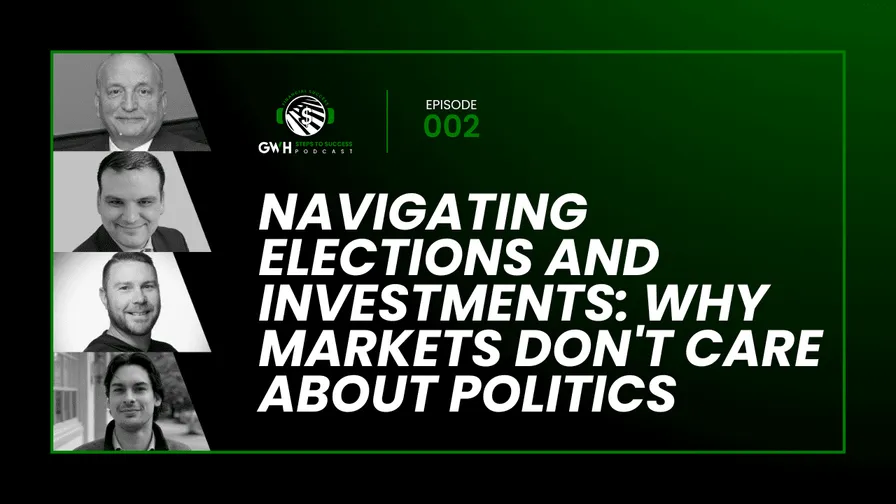
Navigating Elections and Investments: Why Markets Don’t Care About Politics
About This Episode
Welcome to another insightful episode of the GWH Steps to Success Podcast! This week, we tackle a topic that’s on everyone’s mind as the 2024 presidential election approaches: the impact of elections on the stock market. We are joined by Riley Masterson from GWH Advisors and Accountants, who brings his expertise to our discussion, highlighting the often misunderstood relationship between politics and market performance.
The Election Buzz: Separating Fact from Fiction
As the election season heats up, many investors find themselves wondering how political outcomes might affect their portfolios. One of the most common questions we receive is whether one political party is better for market performance than the other. Our analysis reveals that markets have historically performed well under both Democratic and Republican administrations. The key takeaway? Elections spark emotions and opinions, but they don’t necessarily dictate market trends.
Understanding Market Drivers
So, what really influences the stock market if not elections? Economic indicators such as GDP growth, unemployment rates, and inflation play a significant role. Additionally, monetary policy, particularly the Federal Reserve’s interest rate decisions, heavily impacts market dynamics. As we discuss in the episode, the Fed’s current rate-cutting cycle is generally positive for the economy and the markets, as it lowers borrowing costs and encourages spending.
The Importance of Staying Invested
A crucial piece of advice we offer is to remain fully invested, regardless of election outcomes. Attempting to time the market based on political events can lead to missed opportunities and lower returns. Our research shows that investors who stay invested through different administrations fare much better than those who try to adjust their portfolios based on which party holds the White House.
Global Events and Market Volatility
While elections might not sway the markets, global events can cause short-term volatility. Geopolitical tensions, such as those in the Middle East or between Russia and Ukraine, can lead to temporary market fluctuations. However, these are often knee-jerk reactions, and markets tend to stabilize over time.
Conclusion: Listen and Learn
In this episode, we debunk the myth that elections have a significant impact on market performance and provide valuable insights into what truly drives market trends. Whether you’re a seasoned investor or just starting, understanding these dynamics is crucial for making informed decisions. Tune in to the full episode to gain a deeper understanding of how to navigate the financial landscape during election season and beyond.
AND MORE TOPICS COVERED IN THE FULL EPISODE!!! You can check that out and subscribe at www.youtube.com/@GWHAdvisors
Connect with Chris and Riley: https://www.gwhadvisors.com/
Book Your Appointment
Whether it’s a portfolio review or simply seeking guidance on where to start, we’re here to help.



